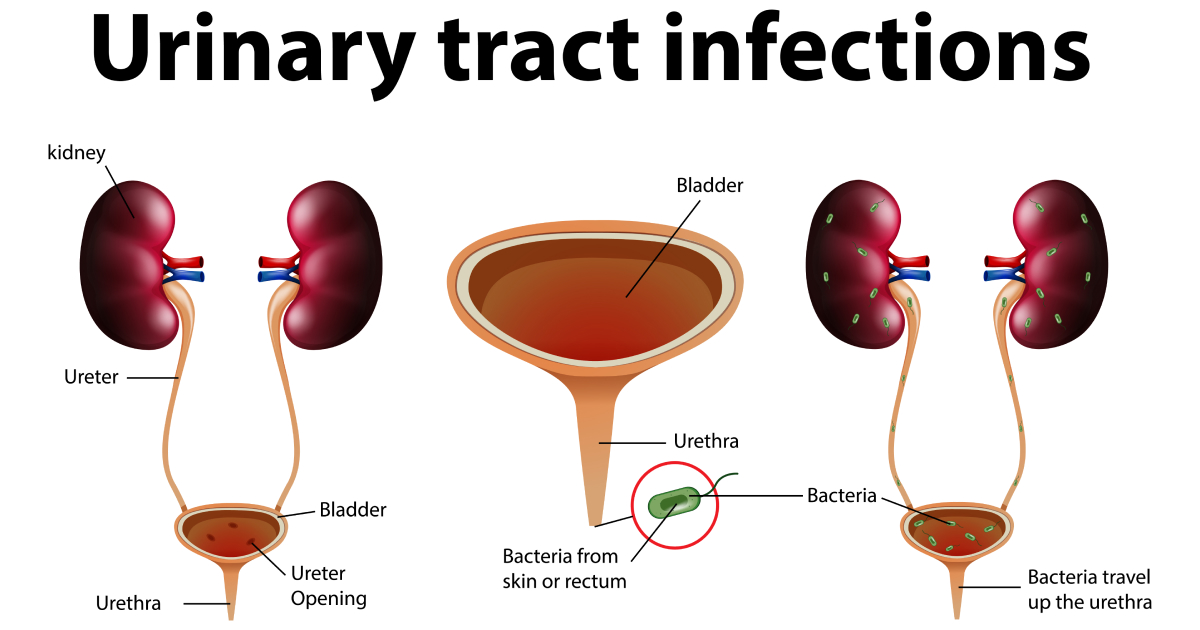
What is UTI?
A urinary tract infection (UTI) is a bacterial infection affecting any part of the urinary system, including the kidneys, ureters, bladder, and urethra. It is the second most common type of infection in the body.
Symptoms
- Burning or pain during urination
- Frequent urge to urinate
- Fever and malaise
- Foul-smelling, cloudy urine
Progression Not all patients will develop kidney failure. About 50% will experience kidney failure by age 60, and 60% by age 70. Risk factors include larger cyst size, early diagnosis, hypertension, proteinuria, and certain genetic mutations.
Causes of Recurrent UTIs
- Urinary Tract Obstruction: Blockages can increase infection risk.
- Female Gender: Women are more susceptible due to shorter urethra.
- Sexual Activity: Increased risk in sexually active women.
- Urinary Stones: Can obstruct urine flow.
- Urinary Catheterization: Higher risk with indwelling catheters.
- Congenital Anomalies: Conditions like vesicoureteral reflux.
- Benign Prostatic Hyperplasia (BPH): Enlarged prostate in older men.
- Suppressed Immune Systems: Increased risk of diabetes, HIV, and cancer.
- Other Factors: Urethral narrowing, tuberculosis, neurogenic bladder.
Diagnosis
- Urine Test: Routine urinalysis for white blood cells and dipstick tests for bacteria.
- Urine Culture and Sensitivity: Identifies bacteria and guides antibiotic treatment.
- Blood Tests: Includes CBC, blood urea, serum creatinine, and C-reactive protein.
Prevention
- Drink 3-4 litres of water daily.
- Urinate every 2-3 hours.
- Consume vitamin C or cranberry juice.
- Avoid constipation and practice good hygiene.
- Wipe from front to back and clean genital areas before and after sex.
- Wear cotton underwear and avoid tight clothing.
Treatment
- General Measures: Stay hydrated, use pain relievers, and avoid bladder irritants.
- Lower UTI (Cystitis): Short-term antibiotics for healthy young females.
- Severe Kidney Infection (Pyelonephritis): Requires hospitalization, intravenous antibiotics, and fluids.
- Severe Kidney Infection (Pyelonephritis): Requires hospitalization, intravenous antibiotics, and fluids.
- Recurrent UTI: Identify and address underlying causes, follow preventive measures, and possibly long-term antibiotics.
When to See a Doctor
- Children with UTI should always consult a doctor.
- Adults should seek medical attention for:
- Decreased urine output
- Persistent high fever, chills, back pain, or blood in urine
- No improvement with antibiotics after 2-3 days
- Severe vomiting, weakness, or low blood pressure
- Single kidney or history of stones
Early diagnosis and treatment are crucial for managing UTIs effectively.


